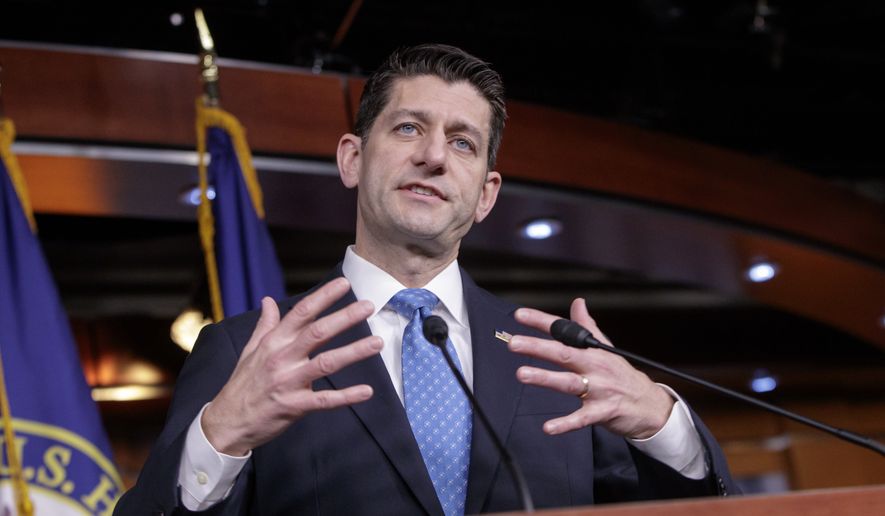House Speaker Paul D. Ryan insisted Thursday the GOP is making “real progress” in rallying around an Obamacare replacement plan, citing a proposed change that would subsidize the costs of sicker consumers so that insurers can drive down costs for healthier ones.
Mr. Ryan, Wisconsin Republican, said the amendment will be added to the existing GOP health plan in the House Rules Committee later on Thursday.
“It will help us build momentum for delivering on our promise to the country,” Mr. Ryan said at his weekly press conference, surrounded by members from conservative and centrist wings of the GOP.
The speaker exuded optimism even though Congress is leaving town for an Easter recess without fulfilling their urgent mission to repeal and replace Obamacare.
Leaders insist they are inching toward consensus, even though conservative and centrist factions spent much of the week pointing fingers at each other for the flagging effort, after the House GOP’s initial bill failed before it hit the floor.
“While we have work to do to get all the way there, we have made real progress this week,” Mr. Ryan said.
Lawmakers casting votes early Thursday said they’d be willing to cut their recess short and return to work on the plan.
“If we get white smoke, we’ll all be advised of that and act accordingly,” Rep. Morgan Griffith, Virginia Republican, said. “I don’t know that it’s a probability, but it’s always a possibility.”
Earlier this week, the White House dispatched Vice President Mike Pence and high-level staff to Capitol Hill to so that Republicans didn’t appear to be stuck in neutral on health care before facing voters back home.
Mr. Ryan said the proposal to subsidize high-risk consumers had buy-in from across the party and “brings us closer to the final agreement that we all want to achieve.”
Rep. Gary Palmer, Alabama Republican, and Rep. David Schweikert, Arizona Republican, sponsored the amendment, which sets up a Federal Invisible Risk Sharing Program modeled after a similar one in Maine.
The four-page amendment gives the Health and Human Services Department wide latitude over how to disperse $15 billion to insurers over the coming decade, including which patients would be covered.
The federal government will oversee the program for three years before it is handed off to the states.
Rep. Mark Meadows, North Carolina Republican, says risk funding is a key ingredient in the conservative House Freedom Caucus’s push to deregulate the individual insurance market and drive down costs for healthier consumers.
Mr. Meadows, who leads the Freedom Caucus, said many members would vote for a bill if GOP leaders pair the new funding with provisions that let states seek waivers from Obamacare regulations that require health insurers to cover a minimum set of benefits, charge the same amount to both sick and healthy customers in a given geographic area and issue policies to customers regardless of their health status.
“Just to be frank, we will make news here this morning. If those offers that were made over the last couple days actually appear in the legislation, the majority if not almost all of the Freedom Caucus will vote for this bill,” Mr. Meadows said during a Politico Playbook interview Thursday.
The House GOP already promised not to charge sicker customers more than others — it’s a popular protection built into Obamacare — so Republicans will have to demonstrate that they are taking steps to care for sicker customers who will be priced out of a deregulated market.
Whether the GOP is injecting enough money into its program will be a matter of debate, however.
“It in fact could be very helpful to reducing insurance premiums and keeping insurers in the game, if it were adequately funded. It isn’t at this level,” said Timothy Jost, a law professor at Washington and Lee University who closely tracks the health care debate.
House Minority Leader Nancy Pelosi said the latest GOP move “is a band-aid on the deep damage that the GOP bill has done,” citing less generous tax-assistance in the bill, provisions that would allow insurers to charge older Americans more than younger ones.
Democrats also say the general uncertainty of the repeal-and-replace effort could cause insurers to flee the marketplace ahead of critical rate-setting deadlines.
• Tom Howell Jr. can be reached at thowell@washingtontimes.com.




Please read our comment policy before commenting.